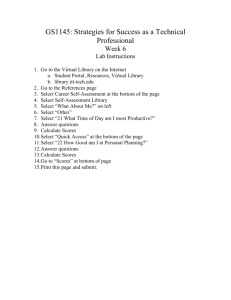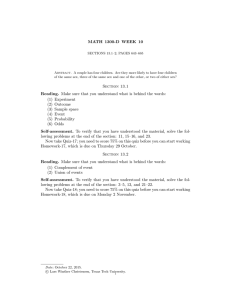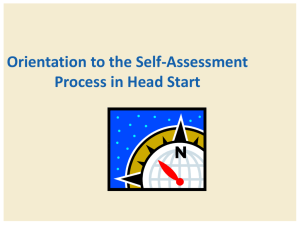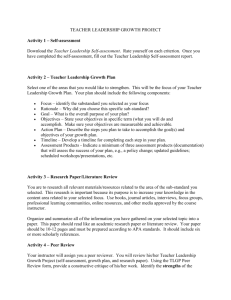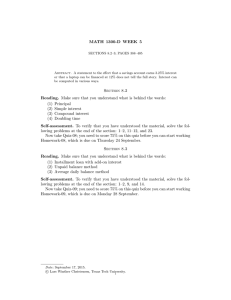The Final Self-Assessment
advertisement
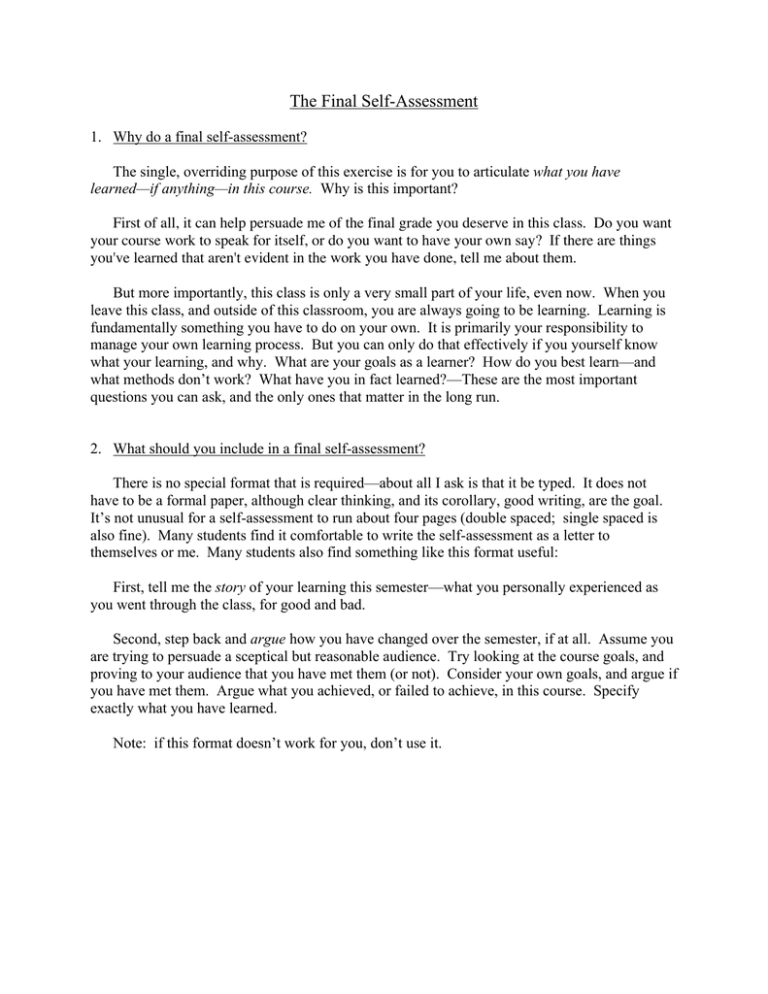
The Final Self-Assessment 1. Why do a final self-assessment? The single, overriding purpose of this exercise is for you to articulate what you have learned—if anything—in this course. Why is this important? First of all, it can help persuade me of the final grade you deserve in this class. Do you want your course work to speak for itself, or do you want to have your own say? If there are things you've learned that aren't evident in the work you have done, tell me about them. But more importantly, this class is only a very small part of your life, even now. When you leave this class, and outside of this classroom, you are always going to be learning. Learning is fundamentally something you have to do on your own. It is primarily your responsibility to manage your own learning process. But you can only do that effectively if you yourself know what your learning, and why. What are your goals as a learner? How do you best learn—and what methods don’t work? What have you in fact learned?—These are the most important questions you can ask, and the only ones that matter in the long run. 2. What should you include in a final self-assessment? There is no special format that is required—about all I ask is that it be typed. It does not have to be a formal paper, although clear thinking, and its corollary, good writing, are the goal. It’s not unusual for a self-assessment to run about four pages (double spaced; single spaced is also fine). Many students find it comfortable to write the self-assessment as a letter to themselves or me. Many students also find something like this format useful: First, tell me the story of your learning this semester—what you personally experienced as you went through the class, for good and bad. Second, step back and argue how you have changed over the semester, if at all. Assume you are trying to persuade a sceptical but reasonable audience. Try looking at the course goals, and proving to your audience that you have met them (or not). Consider your own goals, and argue if you have met them. Argue what you achieved, or failed to achieve, in this course. Specify exactly what you have learned. Note: if this format doesn’t work for you, don’t use it. 3. How can you do a self-assessment well? Tell me what, if anything, you learned. I want to know what, if anything, you take from this class. What will you know, or know how to do, a year from now, based on this last semester’s work? Ten years from now? Think about the overall course goals, and also your own personal goals. The syllabus tells you what everyone can learn in this course. Did you? And remember that you also brought your own personal learning goals to the course, too. Did you meet those? Be honest. If you haven’t learned anything—say so. We all know what the “standard story” for a student is: start the class with high motivation, work hard, make some mistakes, overcome them, end with success. Ignore that story. Tell your story. Be specific. Don’t say you learned a lot and will remember it forever. Tell me exactly what you learned, and how you learned it. Refer to specific work in the class that documents your achievement, or specific events that influenced you. Take some time. Think about this self-assessment off and on for a few days. Or try writing a first draft, putting it aside, and then going back to it a few days later. Don’t be surprised if it takes you some time to figure out what you think about yourself. Talk about yourself. Do not talk about the course or the instructor. Why? If you say bad things about the course, it sounds like an excuse—you’re trying to evade your own weaknesses. If you say good things about the course, it sounds like brownnosing—you’re trying to butter me up. Don’t do either. If, when writing the self-assessment, you find yourself writing extensively about the course (grading scheme, assignments) or instructor, then stop, cut and paste the comments into another document, hand it in as part of the course evaluation (or just email it to me), and then go back to writing about yourself. I am very interested in your thoughts about the course, but in your self-assessment I want your thoughts about you. 4. How will the self-assessment be graded? A self-assessment that shows significant insight into your own learning will result in a one step increase in your final grade (e.g., B to B+).
